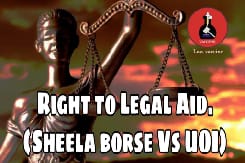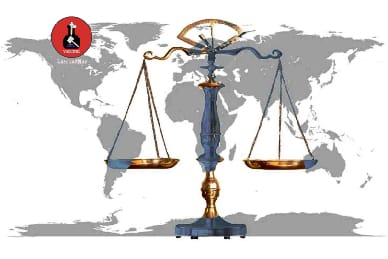Right to legal aid :
“Fundamental rights” are the Magna Carta charter of the Indian constitution. Fundamental rights are cherished to protect the integrity of individuals and create conditions for every individual to enjoy its life and liberty under the protection of Law.
Right to legal aid as per article 21
According to Article 21, the Right to legal aid has been given to all citizens of India. Article 21 states that No person shall be deprived of his life and personal liberty except the procedure established by law.
Legal aid is given to a person who is poor and indigent and cannot afford the legal professional services for any legal proceedings.It is the facilitation by the state to the person for free or lower cost or financial aid for legal assistance. It is basically the right to legal access for justice to all. It is very much in sync with the concept of the Welfare state(Directive principles of state policy PART IV) and social security is given to each individual. Right to have a fair chance of trial.
International origin (Right to legal aid)
The Legal Aid Era has a long back history from the year 1851, in France for assistance to the poor seeking legal help. Later, Britain became part of the same era in around 1944, setting up enquiries on the state role in facilitating legal help to the economically downtrodden persons. It is the basic ground for human rights and natural justice. It is a well-stated principle of Criminal Jurisprudence that one cannot be considered as a criminal under trial till he is convicted.
Indian perspective(Right to legal aid)
In India, the Government’s efforts started in 1952. Various programmes and frameworks, models were being developed by the law dignitaries to give shape to the legal aid revolution in India in late1960’s. Later, in 80’s a committee, CILAS ( committee for implementing legal aid services in India ) under the
Chief justice P N Bhagwati was constituted to supervise the complete mechanism.
Justice V R Krishna Iyer, Developed and incorporated the concept of Legal aid. In the words of Justice Krishna Iyer regarding the concept of legal aid, “it is the state’s duty, not government charity”
The breakthrough came with the introduction of Lok adults in the year 1987, which was a platform for the smooth justice delivery through Conciliation and settlement of disputes. The act was enforced on 9th November 1995(legal services authority act 1987, with certain amendments under Amendment act 1994. (76th Amendment), (Ref: NALSA)( Ref: 5th December, National legal services day )
In the year 1987, the legal services authority act was enacted to give a statutory basis to the legal aid mechanism uniformly across the country. It is not always the person who needs legal help like under trial or so, can only seek legal aid but anyone can seek such help as happened in the below case law.
In Sheela Barse vs Union Of India & Ors on 29 August 1988,[1] it was child welfare PIL and court directed the Central government to pay to the petitioner who was the social worker, Rs 10000 for the expenses and give all support and cooperation, who wanted to gather the information relating to children detained in jails below 18 years of age and information submitting by the authorities are correct. The Court also held the Children’s act to be enforced in all states and implemented across the country and parliament to pass the legislation on the same
According to Article 39 A, Equal justice and free legal aid to the economically weaker section, the state ensures the powerful mechanism to operationalise the legal system to promote justice and provide equal opportunity for free legal aid under special legislation and provisions.
The purpose being to justice has to be free and just, it’s delivery for the poor along with Rights guaranteed fundamental right under (Article 21), Right to equality before the law (Article 14) and Article 22(1), Right to counsel, Right to fair and just trial and procedures.
(Maneka Gandhi vs UOI, 1978 )2]
Free and speedy trial in the case of M. H . Hoskot vs State of Maharashtra[3],The court held that a single right of appeal on facts fraught with loss of liberty is a basis of civilised jurisprudence. “ One component of fair trial and procedure is natural justice” Section 304 CRPC, also provides the provision for the provision of legal assistance to be provided from the time produced before the magistrate and continues whenever for remand
Order XXXIII. R.18 of the Code of Civil Procedure 1908, states that the Government can make provisions for providing free legal services to those who are poor and indigent
Conclusion :
The scope of Legal aid is not restricted to only poor and indigent in general but also to scheduled tribes, scheduled caste who are socially and culturally backward, people who have inaccessibility to the court of justice due to social or geographical factors, the workmen & peasantry class. the soldiers and armed forces personnel. Women and children who are biologically weaker sections and Untouchable who are called Harijan( Article 17 Right against untouchability). The basic instinct of the constitution is to provide equality before the law and equal protection by law to maintain the judicial order with social interests and welfare concepts.
References :
- https://www.mea.gov.in/
- (https://nalsa.gov.in/)
- Constitutional Law : Central law agency
[1] “Sheela Barse vs Union Of India & Ors on 29 August 1988, JT(3),15
Supreme court “
[2] “Maneka Gandhi vs Union Of India on 25 January 1978. 1978 AIR 597,1978 SCR (2) 621
1978 SCC (1) 248
[3] “Madhav Hayawadanrao Hoskot vs the State Of Maharashtra1978, AIR 1548,1979 SCR (1) 192
1978 SCC (3) 544
Article by
Meenakshi sharma


